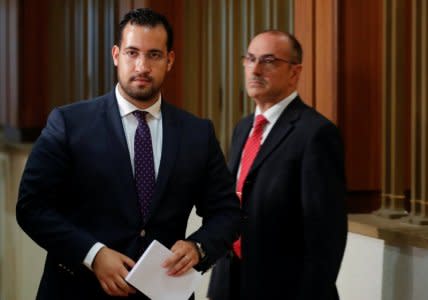Macron's fired former guard defends himself at Senate inquiry

Thomson Reuters
By Brian Love
PARIS (Reuters) - French President Emmanuel Macron's closest security officer, fired after video showed him beating May Day protesters, defended himself before a Senate inquiry on Wednesday, saying he was neither a police officer nor a genuine bodyguard.
Alexandre Benalla, whose case erupted into a political scandal and accusations of unchecked abuses of power in the presidential palace, was questioned for more than two hours about the nature of his job as Macron's security shadow.
Speaking under oath, the neatly dressed former logistics aide at the Elysee was not questioned about the May Day beatings in Paris, but rather his very rapid ascent within Macron's inner circle and how he had gained the right to carry a firearm.
"I was not Macron's bodyguard and never was ... I had a job of ensuring general organization, of security in general," the 27-year-old, who has been accused of abusing his office and securing powers unchecked by higher Elysee staff.
Complaining of what he described as a media frenzy around him, Benalla calmly answered questions about how he came to carry a Gluck 43 pistol and to what extent his logistics job overlapped with the self-attributed role of bodyguard.
The Senate inquiry is being conducted in parallel with a judicial investigation into the May 1 incident, which involved Benalla manhandling protesters during a police-led crowd-control operation. While Benalla had asked to be present at the event as an observer, he ended up directly engaged in security and was seen on video wearing some police-marked clothing.
What turned the incident into a broader political scandal -- the most serious of Macron's 15 months in office -- was the fact Benalla was fired only after the smartphone video became public on July 19, more than six weeks after the events.
That fueled a public perception that the office and people around Macron, whose approval rating has plunged to about 30 percent from highs of 60 percent, were either inept or slack or both when it came to matters of policing and security.
Macron's ministers have rounded on the opposition-controlled Senate, warning member that they risk undermining the presidency and overreaching with their decision to summon Benalla, despite a separate judicial investigation.
In response, opponents have denounced what they regard as an unprecedented attack by the presidency on the parliament.
Benalla himself initially refused to testify, calling the senators "illegitimate" and the investigation's chairman a "little marquis". He flatly apologized on Wednesday, saying he had felt under pressure by the "media frenzy".
Responding to senators' questions without hesitation, Benalla said he requested a firearms permit for his personal safety rather than any bodyguard role. But he admitted he had attended public meetings with Macron with the gun on his belt.
(This story corrects wording in headline; text unchanged)
(Reporting By Brian Love and Michel Rose; Editing by Luke Baker and Richard Balmforth)
See Also:

 Yahoo News
Yahoo News 
